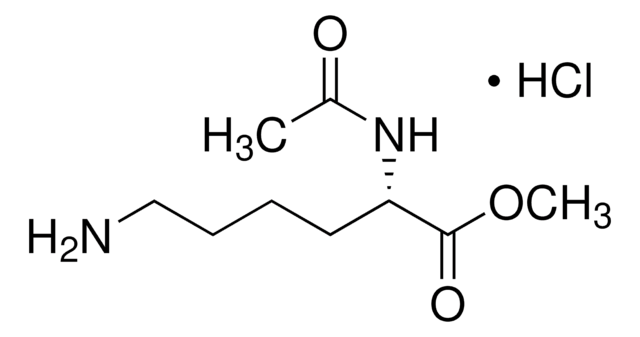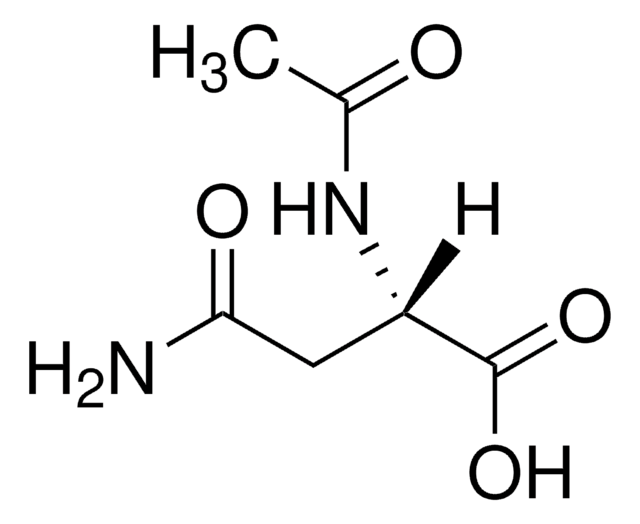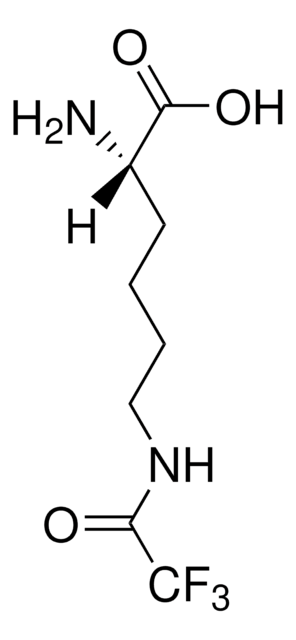A2010
Nα-Acetyl-L-lysine
≥98% (TLC), suitable for ligand binding assays
Synonym(s):
N2-acetyl-L-lysine
Sign Into View Organizational & Contract Pricing
All Photos(1)
About This Item
Linear Formula:
H2N(CH2)4CH(NHCOCH3)CO2H
CAS Number:
Molecular Weight:
188.22
EC Number:
MDL number:
UNSPSC Code:
12352209
eCl@ss:
32160406
PubChem Substance ID:
NACRES:
NA.26
Recommended Products
Product Name
Nα-Acetyl-L-lysine,
Assay
≥98% (TLC)
Quality Level
form
powder
technique(s)
ligand binding assay: suitable
color
colorless to white
mp
256-258 °C (dec.) (lit.)
storage temp.
−20°C
SMILES string
CC(=O)N[C@@H](CCCCN)C(O)=O
InChI
1S/C8H16N2O3/c1-6(11)10-7(8(12)13)4-2-3-5-9/h7H,2-5,9H2,1H3,(H,10,11)(H,12,13)/t7-/m0/s1
InChI key
VEYYWZRYIYDQJM-ZETCQYMHSA-N
Looking for similar products? Visit Product Comparison Guide
Application
Nα-Acetyl-L-lysine has been used as a substrate for lysyl oxidase for synthesis of authentic α-aminoadipic semialdehyde (AAS)-p-aminobenzoic acid (ABA). It may be used in the synthesis of amino acid adducts of 4,4′-Methylenediphenyl diisocyanate (MDI).
Biochem/physiol Actions
Nα-Acetyl-L-lysine is a biologically available N-terminal capped form of the proteinogenic α amino acid L-lysine. Nα-Acetyl-L-lysine is a substrate used to study and characterize lysyl oxidase(s).
Storage Class Code
11 - Combustible Solids
WGK
WGK 3
Flash Point(F)
Not applicable
Flash Point(C)
Not applicable
Personal Protective Equipment
dust mask type N95 (US), Eyeshields, Gloves
Choose from one of the most recent versions:
Already Own This Product?
Find documentation for the products that you have recently purchased in the Document Library.
Customers Also Viewed
Yael Belo et al.
Biochimica et biophysica acta. General subjects, 1863(9), 1343-1350 (2019-06-07)
The signal transducer and activator of transcription 3 (STAT3) protein is activated by phosphorylation of a specific tyrosine residue (Tyr705) in response to various extracellular signals. STAT3 activity was also found to be regulated by acetylation of Lys685. However, the
Jing Bi et al.
Emerging microbes & infections, 7(1), 108-108 (2018-06-15)
The DosR regulon is believed to be a key factor in latency adaptation of Mycobacterium tuberculosis and is strongly induced by multiple stresses, including hypoxia. Previous studies have revealed reversible acetylation of the conserved core DNA-binding lysine residue 182 (K182)
Wenhui Ren et al.
Scientific reports, 7, 39986-39986 (2017-01-04)
As members of bromodomain and extra-terminal motif protein family, bromodomain-containing proteins regulate a wide range of biological processes including protein scaffolding, mitosis, cell cycle progression and transcriptional regulation. The function of these bromodomain proteins (Brds) in innate immune response has
Yoshihiro Nakamura et al.
The Journal of biological chemistry, 282(6), 4193-4201 (2006-12-07)
The BET (bromodomains and extra terminal domain) family proteins recognize acetylated chromatin through their bromodomain and act as transcriptional activators. One of the BET proteins, BRD2, associates with the transcription factor E2F, the mediator components CDK8 and TRAP220, and RNA
Heinz Neumann et al.
Molecular cell, 36(1), 153-163 (2009-10-13)
Lysine acetylation of histones defines the epigenetic status of human embryonic stem cells and orchestrates DNA replication, chromosome condensation, transcription, telomeric silencing, and DNA repair. A detailed mechanistic explanation of these phenomena is impeded by the limited availability of homogeneously
Our team of scientists has experience in all areas of research including Life Science, Material Science, Chemical Synthesis, Chromatography, Analytical and many others.
Contact Technical Service










